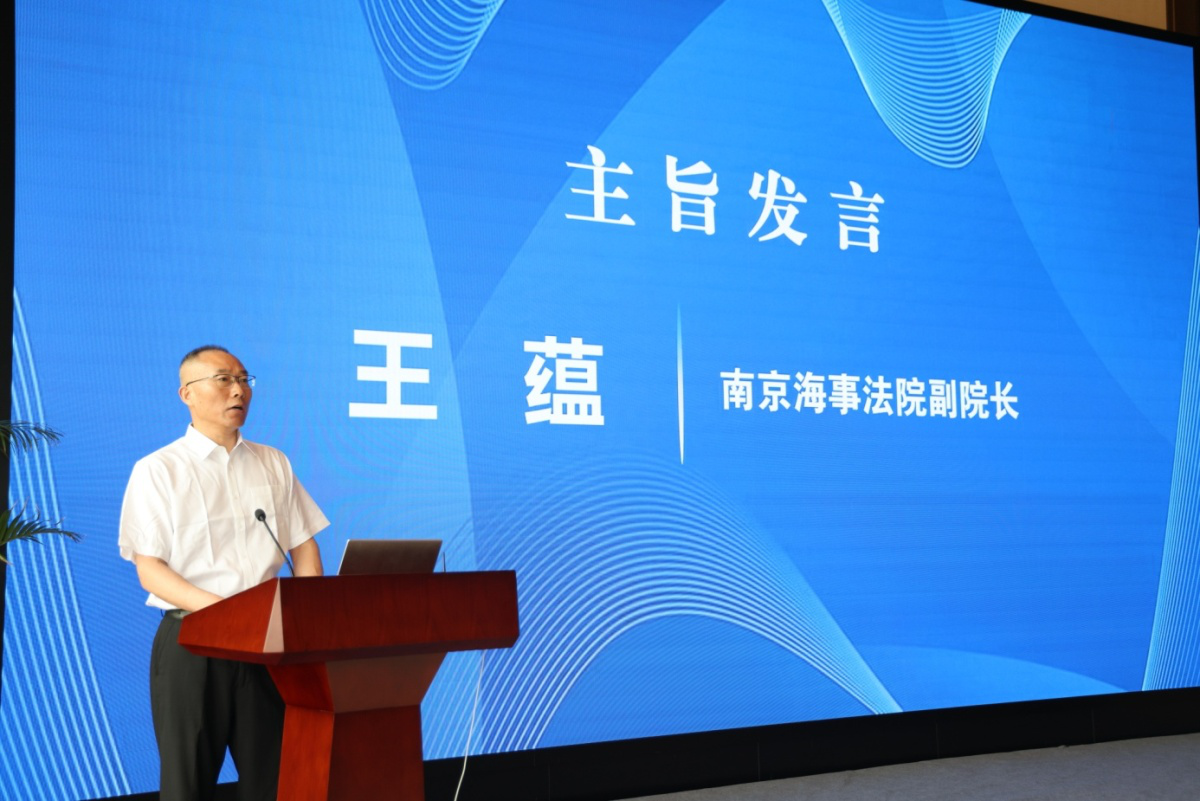
On May 28, 2025, the Annual Conference of the Legal and Commercial Affairs Committee of China Ports & Harbors Association was held in Ningbo, Zhejiang Province. Wang Yun, Member of the Party Leadership Group and Vice President of Nanjing Maritime Court, attended the conference and delivered a keynote speech titled “Maritime Justice Empowering High-Quality Development of the Ports Economy.”
Wang Yun introduced to the attendees the efforts made by Nanjing Maritime Court in supporting high-quality development of the port economy. Based on judicial practice, he summarized three major issues recently observed in port-related cases. Firstly, the lack of coordination between special jurisdiction and territorial jurisdiction constrains trial efficiency Secondly, the involvement of multiple parties in port-related cases increases the difficulty of handling disputes. Thirdly, amid the current international situation, the number of port operation disputes is increasing and the complexity of such disputes is growing.
Regarding providing high-level maritime judicial services to support high-quality development of the port industry, Wang Yun proposed the following initiatives: First, it is essential to optimize judicial supply and support, so as to consolidate the international competitiveness of ports. This entails strengthening maritime courts’ function of special jurisdiction over port-related cases, clarifying the division of responsibilities between maritime and district courts, and providing a solid judicial framework for the professional and efficient resolution of port disputes. Additionally, efforts should be made to enhance the development of specialized judge team for port-related disputes. This entails conducting in-depth and forward-looking assessment on emerging legal issues under new circumstances. Such assessment must appropriately balance all relevant factors, including political requirements, policy directions, law and regulations, and industry trends. These efforts are crucial for improving case-handling capabilities and efficiency, thereby providing solid support for enhancing the international competitiveness of China’s port economy.
Secondly, it is crucial to strengthen the guiding role of the rule of law and promote pluralistic dispute resolution for the formation of a new ports’ legal ecosystem. This involves advancing the systematic development of port-related legal frameworks, actively promoting the harmonization of rules for both coastal and inland ports, and establishing a comprehensive port legal system. Furthermore, efforts should be made to build a dispute resolution mechanism characterized by “lead of judiciary and collaboration of multi-party”. This will require enhancing coordination between courts, maritime safety administrations, ports and harbors associations, and arbitration institutions, as well as improving the pluralistic dispute resolution mechanism that integrates mediation, arbitration, and litigation.
Third, in order to build a model of modernized governance, it is necessary to deepen collaborative governance and resource integration. This involves promoting the integration of multiple resources from the judiciary, administrative agencies, and industry associations. This approach will facilitate cooperation in areas such as maritime data sharing, joint research of complex issues, and assistance with service abroad of documents and evidence investigation. Such efforts will also help overcome challenges related to taking of evidence abroad and fact-finding.
By relying on one-stop dispute resolution centers, seamless integration between judicial adjudication and industry practices can be achieved. Furthermore, a long-term mechanism for collaborative talent development will be advanced. Through the model of “multi-party collaboration & intellectual support”, this initiative aims to provide a governance example and robust talent support for the high-quality development of the port economy.